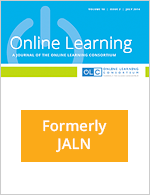Crossing Cultures and Borders in International Online Distance Higher Education
The growing demand for higher education worldwide, along with global expansion of telecommunication technologies, give online distance education a potential world-wide reach for institutions in many countries. Given the persistent international digital divide and the potential for the host institutions and languages to be those of wealthy, industrialized countries, international...

